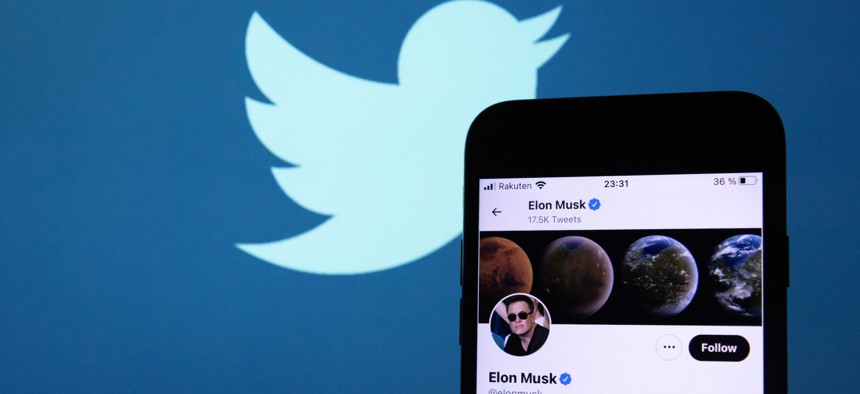
Stanislav Kogiku / SOPA Images / LightRocket via Getty Images
What Does Musk's Purchase of Twitter Mean for Disinformation?
His free-speech values could undermine the site's efforts to stem foreign influence operations.
Elon Musk just bought Twitter; his ideas on free speech suggest the social-media platform might soon do less to moderate content, track extremism, monitor hate speech, and block domestic and foreign disinformation.
Sara Fischer, a media reporter for Axios, said Monday that some of the content moderation and site integrity features that Twitter has put in place since 2016 could be the first thing on Musk’s chopping block.
“Twitter said a couple quarters ago that they were going to spend a lot of money bringing on more people ahead of, I think it was ahead of the 2020 election, to take this type of stuff on,” Fischer said during a Twitter Live conversation about the purchase. “I think Elon Musk takes a look at how big those content, moderation, safety teams have gotten” and he may well decide they are too big.
Sen. Mark Warner, D-Va., said in a statement on Tuesday "As I've acknowledged in the past, Twitter has been more forward-leaning than many of its competitors in its efforts to tackle false, deceptive, and manipulated content - though even Twitter has significant room for improvement. It is my hope that Mr. Musk will work in good faith to keep these necessary reforms in place and prevent a backslide that is harmful to democracy and to the important discourse that takes place on Twitter across the world every day."
Emerson T. Brooking, a resident senior fellow at the Atlantic Council’s Digital Forensics Lab and co-author of the book Like War, said, “Musk has made no secret of his distaste for Twitter's efforts to curb misinformation and harmful content. Now that he has full control, I expect that many of these policies will be reversed. Many malicious actors are about to be given a new lease on life.”
Brooking said Musk seems not to have given much thought to the challenge of foreign interference or “the complexities of terrorist and wartime content moderation.
"When he finds himself responsible for such decisions, he will be in for a rude awakening,” he said.
Cutting those features also could make Twitter less valuable, said Fischer, in part because Twitter’s advertising base has recently trended toward larger, blue-chip companies that don’t like to be associated with controversy. That might not have an immediate impact but could the next time some large social controversy erupts on Twitter, especially if it involves elections.
“The next time we as a country go through some sort of a big social movement, once these guardrails are removed from Twitter, advertisers are going to point more fingers at Twitter than they used to," Fischer said. "And I think that is where if I am a person working at Twitter right now, who's responsible for selling advertising, that's where I'm going to be the most stressed and the most frustrated because you're now putting the product at a huge vulnerability for when those moments come."
The Electronic Frontier Foundation, a nonprofit digital rights advocacy group, said in a posted statement, “Elon Musk’s purchase of Twitter highlights the risks to human rights and personal safety when any single person has complete control over policies affecting almost 400 million users. And in this case that person has repeatedly demonstrated that they do not understand the realities of platform policy at scale.”
But Musk could also move to limit disinformation on Twitter. One idea that he’s publicly entertained is that of verifying the identities (and even the humanity) of all users, rather than just a few. It’s something that Twitter has historically argued against, but it could, in theory, make it harder for foreign information operators to operate bots or masquerade as something that they aren’t. But Elise Thomas, an open-source intelligence analyst at the Institute for Strategic Dialogue, have argued that ending anonymity wouldn’t cut down on abuse or slow foreign agents.
There is also some reason to think that Musk’s takeover might actually help more users fight autocratic regimes. Musk recently donated dozens of Starlink terminals to Ukrainians to allow them to continue to post and access the internet even as Russia attacked communications infrastructure. Vanity Fair’s Nick Bilton, who wrote Hatching Twitter: A True Story of Money, Power, Friendship and Betrayal—many consider it the seminal book on the company—said that Starlink and Twitter could get information into and out of countries with largely closed media environments.
“Take Twitter and you put it with Starlink and there's no way for, you know, Iran or North Korea to shut down internet connection," Bilton said. "That's game-changing. That's world-changing and that's amazing.”
While Musk doesn’t express much support for autocrats, he’s not above acting like one from time to time. One of the consequences of the Tesla founder's purchase is that it gives him access to the non-public and non-encrypted direct messages between users. Musk has a record of taking actions again individuals, such as when he employed Tesla security services to monitor—some say "harass"—a Tesla employee for supposedly leaking to the press. He’s also used his Twitter account to blast critics and others who annoy him.
This post was updated with a statement from Sen. Mark Warner, D-Va.,







